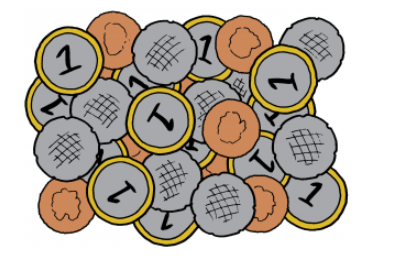Rewarding people without destroying their motivation has been one of the top management challenges in companies employing knowledge workers. Unfortunately, the reward systems used by these organizations incentivize recognition through imaginary performance rather than real merits, causing an extremely negative impact on employee motivation.
Daniel Pink, one of the current greatest researchers on motivation, stresses in his book Drive: The Surprising Truth About What Motivates Us the importance of focusing on factors such as purpose, mastery, and autonomy to stimulate people’s intrinsic motivations, without losing, however, the guideline that a fair salary and a reward system that fosters employee development remains important in meeting the needs of our extrinsic motivators.
Is it possible to create an environment in which rewards can positively impact our motivators without losing their effectiveness in the short and medium-term?
Jurgen Appelo, the author of books such as Management 3.0 and Managing for Happiness, believes so. He argues that decades of research have shown the traditional bonus system rarely has a positive effect on the performance of knowledge workers and proposes some changes in favor of five crucial factors to reverse this picture:
- Salaries should always be expected. Bonuses shouldn’t be. Always keep bonuses as a surprise. When bonuses become frequent and anticipated, they ought to be converted to regular salaries.
- Earnings should be based on collaboration, not competition. When determining how much people should earn, the main criteria should be their collaborative work toward a common goal.
- Peer feedback is the main performance measurement. Contributions to a shared purpose are best detected and evaluated by peers, not by managers. Only the whole system knows all the details.
- Creative thinking can grow the compensation system (not rig it.). Expect that people can (and will) game any system, and tap into that creativity by inviting and supporting it, instead of driving it out.
- Compensation can be used to nurture intrinsic motivation. Make money a reflection of people’s curiosity, honor, acceptance, mastery, and all other intrinsic motivators.
Merit Money
Based on these factors, Jurgen created the Merit Money, a collaborative and continuous bonus system model that encourages support and recognition with focus on actions and behaviors that really contribute to the improvement of the team as a whole. The main idea in this model is to create a secure environment based on mutual trust among team members, empowering them to share the responsibility of rewarding the work of their teammates and doing so at their own discretion.
The Merit Money practice consists in the creation of a fictitious currency, which allows the point accumulation. Periodically, each team member will receive an equal number of points, which must be distributed, completely and publicly, to other team members according to their contributions importance. It is very important that this recurrence is not so short as to not give time to generate contributions, nor so long that people do not remember what happened. In this way, each team member will have the accumulation of credits that, in random periods, can be converted into real money according to a previously agreed conversion rate. As a company that believes in experimentation and provides a safe environment for us to validate our hypothesis, Knowledge21 has decided to bring the Merit Money practice in-house, enabling our Agile Coaches team to experience its use to draw their own conclusions.
As a company that believes in experimentation and provides a safe environment for us to validate our hypothesis, Knowledge21 has decided to bring the Merit Money practice in-house, enabling our Agile Coaches team to experience its use to draw their own conclusions.
For nine months, from April to December 2017, the amount of 1,000 meritecas was deposited each month in the “account” of each coach so that we could distribute them within our team in whatever way we thought was the fairest. The only restriction was that no meriteca deposited by the company could remain in the coach’s account, all should be distributed.
Each transaction was documented in a “donor, value and justification” format and we used a one-to-one conversion rate, where each meriteca corresponded to R$1.00 (Brazilian Reais) which should be redeemed after disclosure of the result.
Initially, we adopted a format where there was only one person responsible for consolidating all transactions and sending to each coach only those referring to his account. In the very first rounds, we felt the impact of centralization, as our schedules were full, and we decided to let any member of the team pull that responsibility.
After a new short period of time, we implemented a second improvement. We made all of the transactions carried out by the team public. Because we are geographically distributed throughout Brazil, after each cycle the results were shared in a Google Drive spreadsheet, allowing each coach to visualize the details of every transaction made on his account as well as on accounts of the others in a transparent way.
Among the main lessons learned, our team of coaches and founders emphasize that:
- The model is a great way to incentivize the culture of positive feedbacks and recognition of good work done.
- Autonomy added to the collective intelligence of the group avoided abuse and mitigated injustices.
- We improved our systemic vision as all coaches began to look at the work of the whole team to provide feedback.
- It reinforced aspects such as that of those who are more socially has more visibility, strengthening the culture of exposing the work done for the whole team.
- It evidenced the maturity of the team: deciding to make values and feedbacks open for the whole group, strengthening a safe work environment, and mutual aid.
- If you have a fair salary, where no one bothers you how much you earn monthly, a variable bonus system will hardly bring negative consequences.
- In a system composed of knowledge workers, it is possible to generate healthy peer pressure and self-organization using extrinsic factors.
- The culture can be positively shaped, following #TrueAgile values even with some money being used as fuel.
- Evaluating behavior rather than outcome has immense value because it helps create a collaborative culture rather than self-serving behavior.
- The model application allows exposing pains that are often hidden from our daily routines, allowing the company culture to have great opportunities for improvement.
There is nothing more powerful than the “behavior drives results” to design exponential organizations and high-performance teams. The right behavior brings the result that the company needs.
Here are some testimonials from all parties involved in the experiment, from founders as sponsors to agile coaches as practitioners:
- “During merit money execution, you begin to understand more deeply what your group values in terms of behaviors, practices, collaboration… This gives you a profound understanding of the group, helping identify what actions may be useful and which moves as a leader should you take.” CFC (sponsor)
- “Although the bonus is an excellent asset, it becomes a totally secondary factor when compared to the exchange of sincere feedback among team members. One benefit is to bring awareness of what is being recognized by the other people in the organization. Having their valued behavior is another great benefit proposed by the model.” Rodrigo de Toledo (sponsor)
- “It is wonderful to see that the team is united around continuous improvement and that it’s fully empowered to play this process. It all depends on trust and it goes both ways – from the founders to the coaches and from the coaches to the founders. So, this empowerment is not something that creates mistrust about something happening behind, it’s total trust.” Marcos Garrido (sponsor)
- “The application of MM was very positive as a tool for valuing small but significant behaviors that would once be rewarded only with smiles and pat on the back.” Avelar Leão (practitioner)
- “I can say that before trying Merit Money, I was very afraid of the negative effects of it. Soon in the first month, I realized that it is a safe enough experiment to try, and it was good enough for the improvements we wanted to make in our team: increase collaboration and team spirit. Over time, it turned a thermometer for me: even though we already have a very strong feedback culture, Merit Money translates into value$ each of these day-to-day feedbacks. To conclude, I say that the self-billing generated and the emerging peer pressure require attention since they can easily turn out to have negative consequences if the participants are not conscientious enough.” Luiz Lula Rodigues (practitioner)
- “One of the aspects that I most liked in the experiment was the confirmation of the systemic vision within our team of coaches. Even the most distant people knew the quality of the work and the difficulties faced by their companions on a day-to-day basis. Very nice to be in Brasilia and receive feedback from coaches that were allocated to other clients, like in São Paulo, for example. The experiment also proved the maturity of our team, further enhancing my pride in being part of Knowledge21. We made the decision together to make all transactions public and at no time did the environment become competitive. Even with all the information available, feedback has remained sincere and focused on collaboration for the development of our peers.” Tadeu Marinho (practitioner)
This was one of our reward experiments. Would you like to do something similar? What are you using in your company? Tell us more in the comments.
Do you want to learn more about knowledge workers and how to lead these professionals through inspirational games, group dynamics, and reflections? Come and see our Management 3.0 training to know how companies around the world are adopting new management practices that value people’s development to generate extraordinary results.
